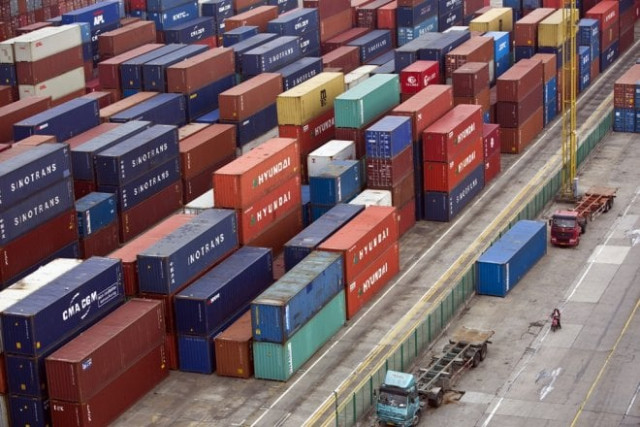Cabinet approves three-year trade framework
Trade policy in contradiction to ‘Vision 2025’ that targets exports of $50b

Trade policy in contradiction to ‘Vision 2025’ that targets exports of $50b. PHOTO: FILE
Without identifying factors affecting the country’s exports and undertaking relevant studies, a cabinet panel on Friday approved, in principle, a three-year strategic trade framework that targets increasing exports to $35 billion before the end of the government’s term.
The Strategic Trade Policy Framework (2015-18) is also in contradiction to the government’s key economic policy document, Vision 2025, that was launched by Prime Minister Nawaz Sharif in August last year. The Vision 2025 promises to increase the exports to $150 billion by 2025 and to $50 billion by 2018.
Headed by Finance Minister Ishaq Dar, the Cabinet sub-committee on Production and Exports approved, in principle, the Strategic Trade Policy Framework, according to a handout issued by the Ministry of Finance. The policy document will now be tabled in front of PM Sharif for his final approval, it added.
The premier had constituted the sub-committee to align the country’s economic policies and sort all inter-ministerial tensions before being brought for approval. The panel failed in its first test and could not align the trade policy framework with the Vision 2025.
The cabinet committee approved the framework without analysing the factors that were affecting the country’s exports, according to officials who attended these meetings. The country’s exports plunged to a three-year low of $23.8 billion in the last fiscal year.
In the first month of the ongoing fiscal year, exports further plunged 17%.
In general, the government knows that excessive taxation, blockade of taxpayers’ refunds by FBR to inflate revenues, exchange rate, decline in commodity prices in the international market and cost of doing business were the key factors that were affecting exports. However, there was no analysis available with the government that could precisely determine which factor played what role, they added.

The Ministry of Commerce could not segregate the international and domestic factors. Resultantly, it would be difficult to achieve even the $35-billion target by 2018, said the officials.
Minister for Commerce, Khurram Dastgir, was not available for comments.
“In the new trade policy, the government has identified the short-term goals which would help build the pace of exports in the next three years,” said Planning and Development Minister Ahsan Iqbal, adding that at present the international market was depressed but it was hoped that exports would accelerate at a rapid pace after 2018.
Finalise targets, Dar tells ministries
Finance Minister Ishaq Dar, however underscored the need for identifying and undertaking urgent measures to boost production and exports. He directed the relevant ministries to immediately finalise their short-term targets with corresponding action plans and present it before the Committee in its next meeting.
The meeting was informed that the plan of action had been put into a state of readiness and as soon as the Policy is approved, its implementation would be carried out immediately.
The State Bank of Pakistan (SBP) gave a briefing to the cabinet committee on export-led growth models focusing on Malaysia, South Korea, Turkey and Singapore. It was noted that value addition, diversification, technology and Research & Development (R&D), ease of doing business were key elements to boost exports, said the Ministry of Finance.
It was also highlighted by the SBP that key constraints on this score currently being faced by Pakistan related to lack of research and development and technology initiatives, concentration in traditional products, limited resource availability, fragmentation and inadequate investment in the infrastructure.
The government also deliberated the new trade policy framework in a meeting of Monetary and Fiscal Policies Coordination Board, which was also chaired by Dar.
The Board kept its deliberations to the extent of agreeing to the need of ‘taking all possible measures to reverse the trend’ of declining exports. It did not recommend any specific measures to enhance exports.
“There is no complete picture available that could tell the reasons for decline in exports,” said a member of the Board while speaking on condition of anonymity.
Published in The Express Tribune, August 29th, 2015.
Like Business on Facebook, follow @TribuneBiz on Twitter to stay informed and join in the conversation.



















COMMENTS
Comments are moderated and generally will be posted if they are on-topic and not abusive.
For more information, please see our Comments FAQ